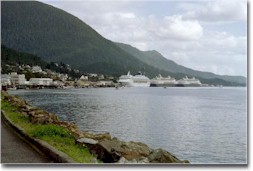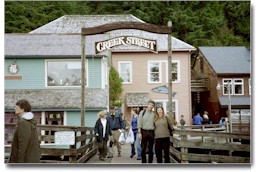
View Of Cruise Ships

Creek Street, Ketchikan

Ketchikan Dock
|
About Ketchikan
Ketchikan is on the west coast of Revillagigedo Island near the southern boundary of Alaska. (We call it Revilla for short!). The name comes from the Tlingit word �kitschk-hin�, which means thundering wings of an eagle. At certain tides in Ketchikan Creek, among the rocks and current, one can visualize an eagle with his wings spread. Revilla Island is a part of the largest temperate rainforest in the world. Ketchikan receives only about 30 inches of snow but around 13 feet of rain per year! Winters can be cool but usually around the 30�s. Summers are mild with temperatures in the 60�s but often in the 70�s and 80�s. During the summer solstice Ketchikan has up to 20 hours of daylight. Our groups wonder how to dress: light layers, hat or cap, walking shoes, and don't forget the sunglasses!
In the 1880�s the first white settlers came here mainly for the salmon. At first there were salmon salteries, then later canneries, which gave Ketchikan the title of the Salmon Capital of the World. By the 1930�s 13 canneries were in operation producing more than 2 million cases of salmon per season with a value of $5million a year. During this time Ketchikan was the most populous city in Alaska. Salmon populations however were being decimated by the use of floating fish traps which allowed enormous amounts of salmon to be trapped and later brailed aboard scows to be taken to the canneries. The US government bought huge quantities of canned salmon during both World Wars. Alaska became a state in 1959 and subsequently put a ban to the fish traps. Salmon runs came back in the 1980�s but with the advent of fish farms mainly in Chile and Norway prices plummeted to pennies a pound. Today two canneries and a handful of cold storages are all that remains in Ketchikan.
Another business on the island was timber and pulp. A $50 million pulp mill was constructed at Ward Cove, just outside Ketchikan, in 1954. It supplied a desirable year around job for a seasonal working town. The pulp mills 50 year contract with the US Forest Service was cancelled in the 1990�s and the mill closed in 1997.
Today commercial fishing and harvesting timber are still around but tourism has taken over with close to a million tourists visiting Ketchikan yearly.
|
|


